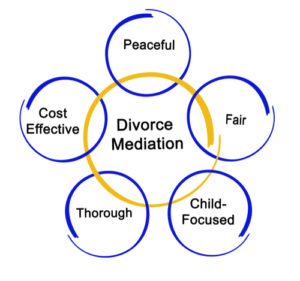 Many of my Divorce and Child Custody clients ask, “What is mediation?” In a nutshell, mediation is an alternative to dragging ourselves, family members, and friends through the court process. It’s much faster, saves a ton of money, and generally gets far better results than going to trial.
Many of my Divorce and Child Custody clients ask, “What is mediation?” In a nutshell, mediation is an alternative to dragging ourselves, family members, and friends through the court process. It’s much faster, saves a ton of money, and generally gets far better results than going to trial.
In mediation, the parties meet with a mediator instead of a judge. The mediator asks questions to understand the issues – but unlike a judge or attorney, the mediator does not make decisions, does not weigh evidence, and does not advise the parties what should or should not happen. The mediator’s primary (often only) role is to help the parties work together to find a resolution that each side can live with.
Mediation can follow many different formats. In Utah domestic cases (e.g. Divorce, Custody, etc) mediation most typically proceeds as follows:
- First, Introductions: the mediator introduces mediation and gets to know the parties and the issues in their case. The parties may be together for this step or in separate rooms.
- Second, Inquiry: the mediator asks each party in turn more probing questions about the issues and how each party would like to resolve each issue. More often than not, the parties are in separate rooms and the mediator shuttles back and forth.
- Third, Negotiation: the mediator assists the parties exchange offers and counter offers and helps the parties find common ground.
- Fourth, Documentation: if the parties reach a resolution (which happens more often than not), the mediator helps the parties document their agreement. This may result in a Memorandum of Understanding or Stipulation (both fancy ways of saying “written agreement”). If the parties do not reach a resolution, the mediator documents who attended mediation and that no resolution was reached.
That’s it. That’s all there is to it.
 Of course, it’s not quite that simple. It is rare that either side gets in mediation everything they want. Almost always, mediation requires some give and take on both sides. It is therefore important to have a mediation plan, to identify what issues are most important, and to know which issues are not worth fighting over and which issues are worth going to court over.
Of course, it’s not quite that simple. It is rare that either side gets in mediation everything they want. Almost always, mediation requires some give and take on both sides. It is therefore important to have a mediation plan, to identify what issues are most important, and to know which issues are not worth fighting over and which issues are worth going to court over.
It is important to talk and plan for mediation with an attorney experienced in mediation representation. If you need representation for mediation, if you have questions about the mediation process, or if you would like to more, Felt Family Law, PLLC today.


